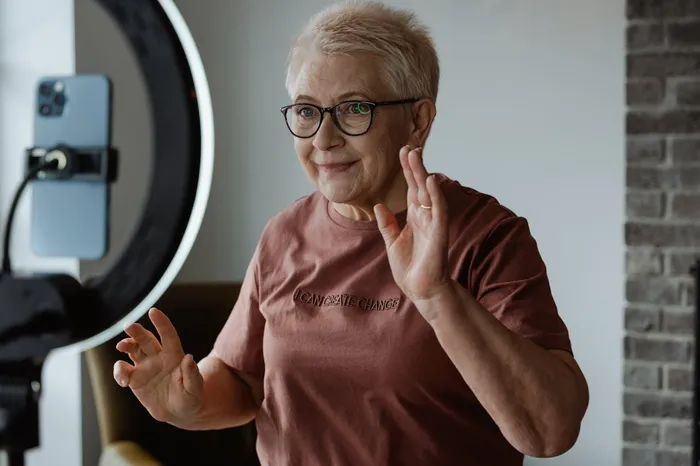Oops, you sound ancient: phrases boomers use without realising they're out of touch

Whether at work or just down the street, the lingo gap between boomers, Gen Xers, millennials and Gen Zs can feel like a generational chasm.
Image: Andrea Piacquadio /pexels
There’s that one moment when it hits you, you’re the aunty now.
Maybe it’s when a teenager in the taxi says “Skibidi …” and you’re still trying to Google what skibidi is. The language barrier between boomers, Gen Xers, millennials, and Gen Zs can feel like a generational chasm, whether at work or in everyday life.
Language is more than words; it’s power, attitude, and identity. Slang evolves to create belonging. So when your mum says “Back in my day …” or your uncle lectures you about pulling yourself up by your bootstraps, it’s not just an innocent phrase.
It’s an echo of a world that doesn’t exist anymore.
The differences in the way Baby Boomers, Gen X, Millennials and Gen Z speak have sparked everything from playful memes to serious debates about empathy, privilege, and social change.
While it might be easy to laugh off “OK Boomer” moments, experts say these phrases often reveal real generational divides. Sociolinguists say language doesn’t just communicate ideas; it communicates values.
When an older person says something that feels dismissive to a younger listener, it can unintentionally shut down dialogue.

The differences in the way Baby Boomers, Gen X, Millennials and Gen Z speak have sparked everything from playful memes to serious debates about empathy, privilege, and social change.
Image: MART PRODUCTION /pexels
Here’s a closer look backed by research and expert insight at why some classic “boomer phrases” sound tone‑deaf today, and why these differences matter more than ever.
1. “Back in my day, we worked hard and didn’t complain.”
At first glance, it sounds like wisdom about grit. But to many Millennials and Gen Z, it feels like an accusation of laziness.
Saying “No one helped me” ignores the privileges many older generations had: affordable houses, free university education and stable jobs. Millennials and Gen Z are paying off debt for degrees that don’t even guarantee work.
2. “You’re just too sensitive.”
Often said during debates about race, gender or mental health. It frames caring deeply as weakness.
Why does this feel off? Empathy isn’t oversensitivity; it’s an emotional skill that helps us build healthier communities.
3. “If you don’t like your job, just get another one.”
It sounds practical until you see today’s hyper‑competitive market, where an entry‑level role may demand years of unpaid internships.
Why this isn't the advice you think it is: According to Statistics South Africa, youth unemployment remains above 40%. For many, switching jobs isn’t just about choice; it’s about survival.
4. “Why are you always on your phone?”
To older generations, constant phone use seems like a disconnection. But to younger people, it’s part of life, work, activism and social ties
Why it feels off: Ironically, Boomers are now one of Facebook’s fastest‑growing age groups, showing that even older generations eventually see the value in digital connection.
5. “We never needed therapy"
The great therapy divide. Another awkward classic: “We didn’t need therapy, we just dealt with it.” For older generations, mental health was whispered about, if at all.
But today, younger people talk openly about anxiety, depression and burnout. They want to heal, not hide.
The South African Depression and Anxiety Group (SADAG) reports a steady increase in young people seeking help.
“Therapy is not weakness,” says Zane Wilson, founder of SADAG. “It’s resilience in action.”
6. “I don’t see colour.”
Meant to show equality, this phrase can erase lived experiences of racism.
“I don’t see colour, we’re all the same." On the surface, it feels like unity. Not seeing colour can mean ignoring racism. “We can’t fix what we refuse to see.”
7. “Buy a house instead of renting.”
Housing is another hot potato. Older folks will say, “Stop renting, you’re wasting money.”
But in 2024, buying a house is out of reach for most young South Africans. The FNB Property Barometer shows that South African home prices have grown faster than wages, making ownership unrealistic for many young adults.
8. “Stay loyal to one company.”
Boomers came up in an era of pensions and long‑term job security. Today, job‑hopping often leads to higher pay and skills.
Why it feels off: A 2023 report by Deloitte found Gen Z and Millennials view loyalty differently; they prioritise learning and purpose over tenure.
9. “Kids today have it so easy.”
A nostalgic favourite. Yet each generation faces unique battles.
Why it feels off: Yes, some things like Googling anything are easier. But navigating social media pressure, climate anxiety, and economic precarity are challenges Boomers never faced.
Language reflects culture, but it can also reinforce blind spots. Recognising why certain phrases hurt or sound outdated isn’t about blame; it’s about understanding.
Every generation thinks the next one is ruining language. But what we’re really seeing is society changing.
Related Topics: